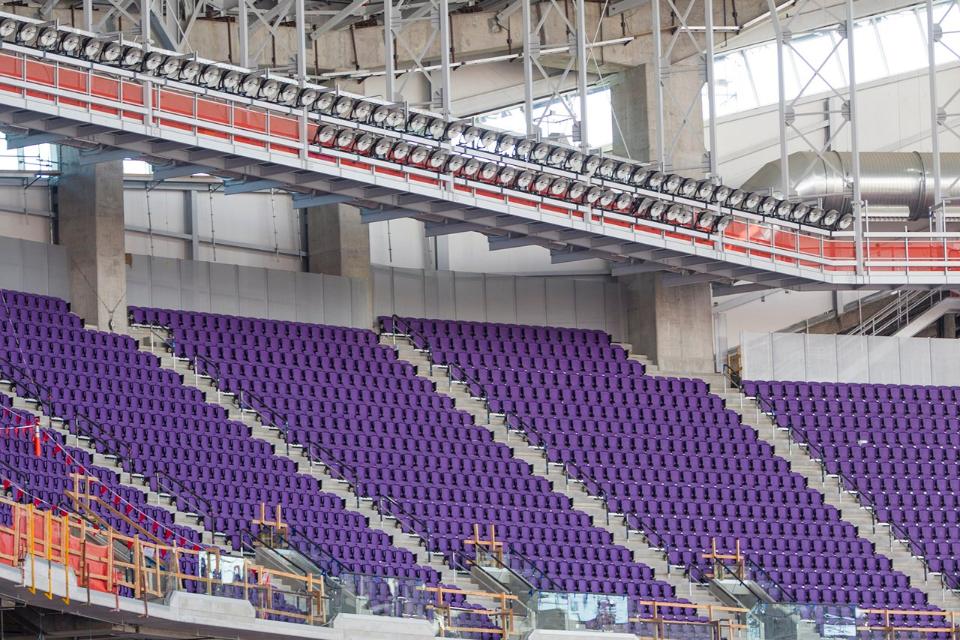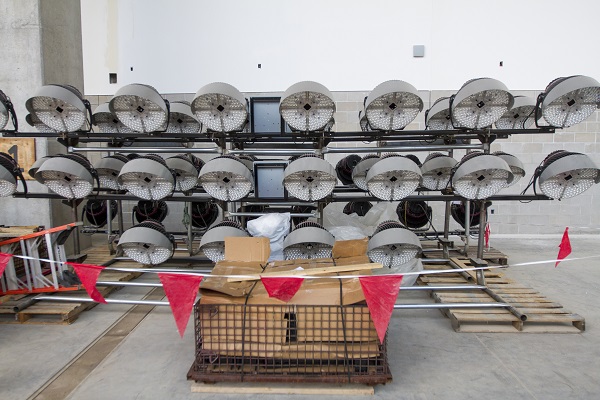 |
Minnesota will be the first city that takes advantage of LED lighting in a large-scale environment like the NFL stadium. (All Photo Courtesy of U.S. Bank Stadium)
|
Game action inside U.S. Bank Stadium is less than a year away, but installation of a high-tech lighting system that will benefit broadcast cameras and spectators has begun.
Ephesus Lighting has developed a patented system of LED lights that will be the first of its kind in a new NFL venue.
“Minnesota really is going to be the first one to really take advantage of this technology in a large-scale environment like this,” said Ephesus Chief Technology Officer Joe Casper. “They’ve done it in smaller venues, but not an NFL stadium, especially a brand new stadium like this. We just released this technology we’re putting in Minnesota this year, so it’s the most-advanced technology you can get on the market.”
The upgraded lighting, which the Vikings agreed to cover with a $1.3 million commitment earlier this year, will have the capability to enhance fan experiences during games, in the lead up to kickoff and during breaks like halftime.
“We are excited about this state-of-the-art lighting system because of the impact it will have on the fans inside U.S. Bank Stadium and those watching on broadcast television,” Vikings Owner/President Mark Wilf said. “The versatility and responsiveness of the lighting will positively impact all events at U.S. Bank Stadium, including Super Bowl LII.”
Crews have begun installing the system’s LEDs at the upper interior ring of the stadium. They use a computer-generated model and simulator to coordinate alignment to provide balanced lighting to help player performance and fan experience because of increased visibility and the prevention of glare.
“We take the light and purposefully model around obstacles that are on the field, players, the balls, so it’s like being in a portrait studio with lighting behind, lighting in front, and you look perfect,” Casper said. “We take great care of taking light from various aspects of the catwalk, and it’s being aimed to create light from 16 different directions so it gives you the appearance that you’re in a studio.”
Casper said the LEDs will have controls to allow for adjustments according to the amount of sunlight entering U.S. Bank Stadium, as well as the changing of the light’s color temperature for different events. He said football games are generally best-enjoyed with a medium color temperature of lighting, basketball games with a warmer color temp (yellowish white to red), and hockey games cooler (bluish white). A similar smaller system (120 LED fixtures) has been retroactively installed in Bridgestone Arena, the home of the Nashville Predators and host of this season’s NHL All-Star Game. The NFL stadium in Arizona also has been retrofitted.
Halftimes for regular season NFL games are limited to 12 minutes, but intermission is expanded for the Super Bowl. There’s still a tight window for stage set-up, performance and removal. In most host venues, the performance must end to allow approximately 15 minutes for metal halides to reach full brightness. There’s no such waiting period for the LED system.
While Left Shark might have been the biggest talk of the Super Bowl XLIX halftime show, Ephesus Lighting’s technological LED system gave Katy Perry more time to perform.
“We lit the Super Bowl this past year at Phoenix, and it gave 12 extra minutes for the halftime show because of the instant-on, instant-off capability,” Casper said.
 |
The instant-on and instant-off feature of LEDs will allow the halftime show an extra 12 minutes in the stadium.
|
In addition to the multipurpose benefits, Casper said there’s an estimated energy savings of more than 75 percent.
The colors of jerseys and the turf will be truer, Casper said, because of the LED lighting system.
“That’s going to add not only to the fans in but also for the broadcasting,” Casper said. “We built this for broadcasting, so we’ve spent a lot of time with all of the networks to make this system for the ease of broadcasting. It will be the best-lit broadcasting stadium on the market.”
The system is made in America by the company that is based in Syracuse, New York. Pride in the project, Casper said, is giving the area known for orange a purple hue.
“It’s the biggest thing in Syracuse,” Casper said. “I think everyone is going to switch from orange of the Syracuse Orangemen to purple of the Minnesota Vikings.”













